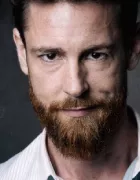As of March 15, 2021, Prof. Dr. David Ebert has accepted TUM's call to the new Professorship of Psychology and Digital Mental Health Care. Previously, he was Associate Professor of Clinical Psychology at VU University Amsterdam since October 2018.
After originally studying to become a teacher of mathematics and music, Prof. Ebert worked as a Research Associate in the Department of Clinical Psychology and Psychotherapy at Philipps University Marburg from 2009 to 2014. At the same time, he was the operational project manager of the competence tandem Gesundheitstraining.Online at Leuphana University Lüneburg from 2011 to 2014. He received his doctorate in psychology with special distinction (summa cum laude) from Philipps University Marburg in 2013.
From 2014 to 2015, Prof. Ebert was a Postdoctoral Research Follow at the Department of Health Care Policy at Harvard Medical School in Boston/USA. Subsequently, he habilitated at the Department of Clinical Psychology and Psychotherapy at Friedrich-Alexander University (FAU) Erlangen-Nuremberg in September 2018.
Dear Prof. Ebert, what was the decisive factor in your decision to move from VU University Amsterdam to TUM?
"As a psychologist, I do digital health research, so accordingly I need an environment that has a certain technology orientation. Especially the future field of artificial intelligence is very interesting for me, furthermore the question of how to use this technology at all to improve prevention and screening of diseases. This is per se my field of research and an interdisciplinary topic from psychology, medicine and computer science. Interdisciplinarity is of course extremely important across departments. I bring psychology with me myself, and TUM offers optimal conditions for all other areas. I myself am strongly research-oriented, and TUM itself naturally has an excellent reputation for being very strong in research."
What does the call to TU Munich mean to you?
"For me, the call is the step into a long-term on-site perspective. I am very well connected internationally, but it was always clear that it was only a temporary location, so it was always the next step. I moved around a lot, from the University of Marburg to Amsterdam in the meantime, then to Boston to Harvard Medical School, from there to Erlangen and back to Amsterdam. I have many co-authors, the majority of whom have always been cross-regional. My research is interdisciplinary and I work in international networks. Now I'm especially looking forward to being able to collaborate with top researchers locally."
What is your impression of the Department of Sport and Health Sciences so far?
"My team and I are working completely from home office during Corona. In this respect, most of them have not currently moved physically to the Department, which is why there have not yet been many points of contact outside of online teaching that is already underway. Other than that, I'm currently still in talks for all of my PhD students to move to the Department. Beyond that, however, there has been little contact so far due to the pandemic."
Looking ahead to your work at the Department of Sport and Health Sciences, what are you most looking forward to?
"On the one hand, I'm most looking forward to teaching in the area of prevention and early intervention for mental illness. In my opinion, this is a very important topic, but one that has been insufficiently addressed in university teaching in Germany. That's why I think it's nice to bring this focus into the field of health sciences, because it fits well together. In addition, we have the future orientation in mind, so how can we use technology to solve such important social problems. On the other hand, I'm looking forward to collaborations in the field, for example, combining computer science and medicine to answer the question of how to bring together competencies to improve prevention and intervention, especially of mental illness."
So far, you have also been head of the Protect Lab, an interdisciplinary research unit. Will you continue in that role?
"I will remain head of the Protect Lab, which we have since moved to TUM. After working at several universities at times simultaneously, my colleagues from Amsterdam, Berlin and Erlangen have all become part of the Protect Lab. In it, we are researching technologies to improve the prevention and treatment of primarily mental disorders, but also chronic-somatic diseases. The term 'Protect' stands for Behavorial Health Promotion & Technology."
What will be your research focus with our Department?
"The focus of my research is on how to use digital approaches to promote mental health. Specifically, on the development and evaluation of digital health interventions for mental health promotion with a particular focus on prevention and early intervention and treatment of mental illness. Here, I am primarily driven by the question of how to reach people via innovative evidence-based approaches who otherwise would not receive adequate support at all or only after a long period of suffering. However, another area of research is student health in general and student mental health specifically. I am part of a WHO World Mental Health Network in which we do similar research in about 20 countries worldwide. We founded this network during my time at Harvard together with Ronald Kessler. I would be very happy if I could establish this sector at TUM as well. One aspect of it is to support students to develop competencies during their studies as well as to improve their own mental health. You can combine that well in the health sciences with events where you learn such methods for yourself, but at the same time learn how to teach them to others."
What topics will you focus on in teaching?
"In addition to mental health prevention and intervention, another focus of our teaching will be on using digital technologies to improve prevention and care."
And one last question: do you play sports yourself? And if so, which ones?
"In keeping with the Department of Sport and Health Sciences, I played beach volleyball for a long time, but I have to admit that this unfortunately fell asleep after an injury, mainly due to work. Otherwise, I like to go to the gym or do strength exercises at home, but lately unfortunately far too little. Instead, I meditate every morning, which is not a 'physical' sport, but has important effects of daily balance for me."
Thank you very much for the interview!
To the homepage of the Protect Lab
Contact:
Prof. Dr. David Ebert
Professorship of Psychology and Digital Mental Health Care
Georg-Brauchle-Ring 60/62
80992 München
e-mail: david.daniel.ebert(at)tum.de
Text/Interview: Romy Schwaiger
Photos: private/Protect Lab

